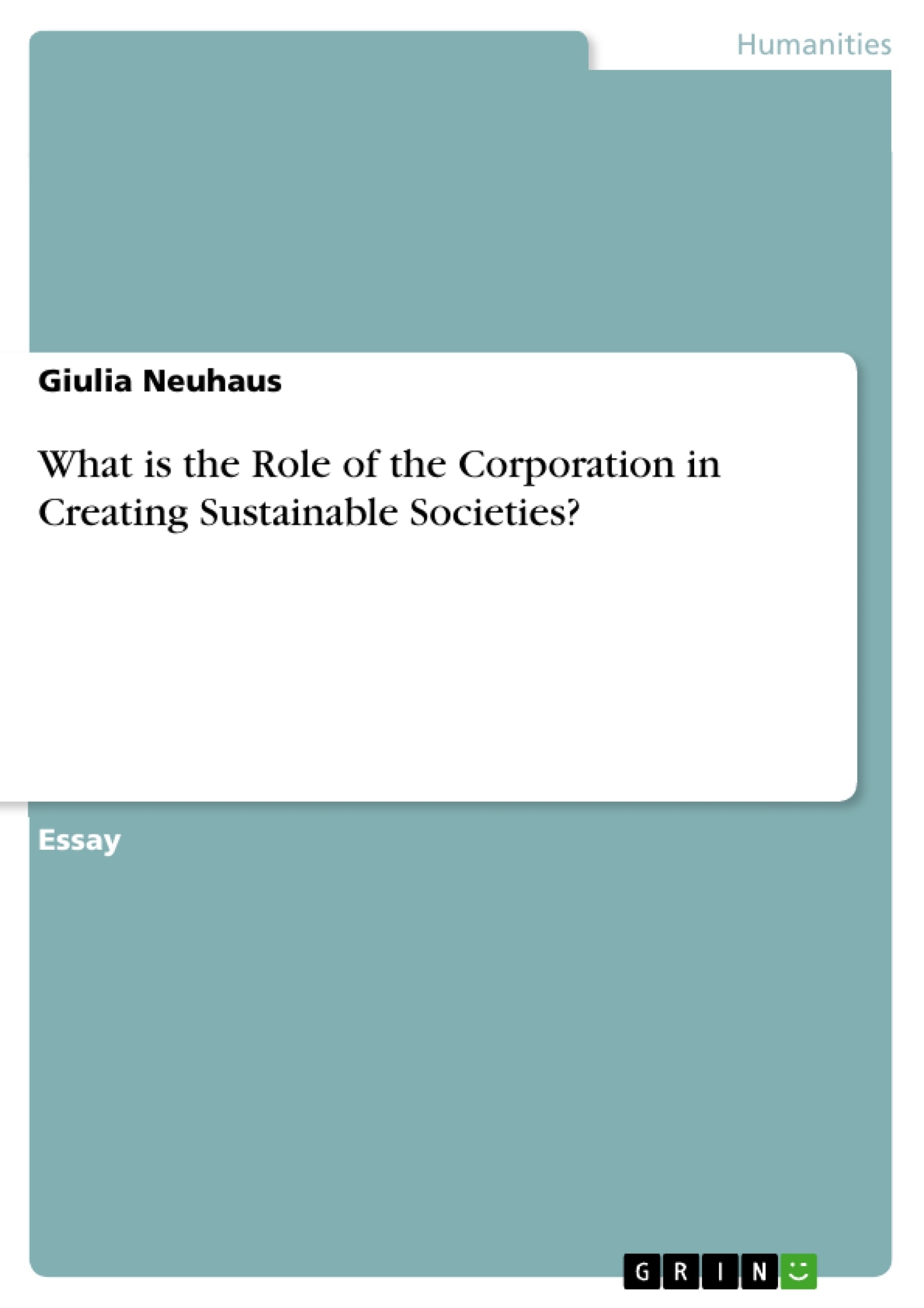This essay elaborates on the role of the corporation in creating sustainable societies. It draws on different concepts, such as Corporate Social Responsibility (CSR) and benefit corporations, and argues for a systemic change regarding the relationship between private sector, societies and the natural environment to create an environment for sustainable societies to thrive.
In 1972, the simulation study Limits to Growth issued a warning on perpetual economic growth within the system of finite resources of planetary boundaries. Since the threats of ceaseless growth have been recognized, the pursuit of sustainability has been high on the global agenda. The term is premised on the definition of sustainable development from the report Our Common Future, which limits the satisfaction of present needs to the extent it hampers future generations to satisfy their own. It triggered an accruing plethora of diverging definitions, each taking a different angle on the concept in order to meet the manifold prerequisites of its convoluted nature.
Due to the ambiguous interpretations of sustainability, there is no objective ‘ideal state’ societies can aim for. Coomer (1981) elaborates that sustainable societies seek to find "an equitable relationship with the physical environment (…) [and] will not generate changes that may seriously impair that which sustains [them] […]", which emphasizes the notion of development rather than achievement. Paired with the ‘Brundtland+’ definition by Van de Kerk and Manuel (2008), sustainable societies effectuate sustainable development while "each human being has the opportunity to develop itself in freedom, within a well-balanced society and in harmony with its surroundings" and "looking for alternative ways of growing".
Inhaltsverzeichnis (Table of Contents)
- Introduction
- The Responsibility of Businesses
- Beyond Corporate Social Responsibility
- Businesses as Harbingers of Sustainable Development?
Zielsetzung und Themenschwerpunkte (Objectives and Key Themes)
This essay explores the role of businesses in creating sustainable societies and analyzes how current voluntary activities contribute towards sustainable development. It critically examines the limitations of corporate social responsibility (CSR) practices and argues for a paradigm shift in business models to effectively contribute to global governance around sustainable development.
- The responsibility of businesses in creating sustainable societies
- The limitations of corporate social responsibility (CSR) practices
- The need for a paradigm shift in business models to contribute to global governance around sustainable development
- The role of businesses as development agents
- The impact of unsustainable business behavior on the environment and society
Zusammenfassung der Kapitel (Chapter Summaries)
- Introduction: This chapter introduces the concept of sustainable societies and its historical development, emphasizing the pursuit of sustainable development within the context of finite resources and the need to balance present needs with future generations. It highlights the ambiguity surrounding the definition of sustainability and the importance of considering both economic and social well-being.
- The Responsibility of Businesses: This chapter examines the responsibility of businesses in creating sustainable societies, exploring the contrasting viewpoints of those advocating for shareholder primacy and those emphasizing businesses' role as development agents. It discusses the increasing pressure on businesses to demonstrate their contributions towards sustainable development and the rise of voluntary initiatives like CSR.
- Beyond Corporate Social Responsibility: This chapter delves into the complexities of defining and implementing CSR activities, analyzing different approaches and classifications of CSR initiatives. It examines the effectiveness of codes of conduct as a CSR instrument and highlights the challenges of ensuring ethical behavior within corporate structures.
Schlüsselwörter (Keywords)
The main keywords and focus topics of this text include sustainable societies, corporate social responsibility (CSR), sustainable development, business ethics, development agents, stakeholder engagement, ethical business practices, and environmental and social responsibility.
Frequently Asked Questions
What is the role of corporations in creating sustainable societies?
Corporations act as development agents that must move beyond voluntary CSR to effectuate systemic changes in their relationship with society and the environment.
What are the limitations of Corporate Social Responsibility (CSR)?
CSR is often criticized for being voluntary and ambiguous, sometimes lacking the depth needed to address the systemic threats of ceaseless economic growth.
How is a "sustainable society" defined?
A sustainable society seeks an equitable relationship with the physical environment, ensuring development that does not impair the systems that sustain it.
What was the significance of the 1972 'Limits to Growth' study?
The study issued an early warning about perpetual economic growth within the finite resources and planetary boundaries of Earth.
What is the 'Brundtland+' definition of sustainability?
It emphasizes sustainable development where every human can develop in freedom and harmony with their surroundings while seeking alternative ways of growing.
- Arbeit zitieren
- Giulia Neuhaus (Autor:in), 2019, What is the Role of the Corporation in Creating Sustainable Societies?, München, GRIN Verlag, https://www.grin.com/document/991967



